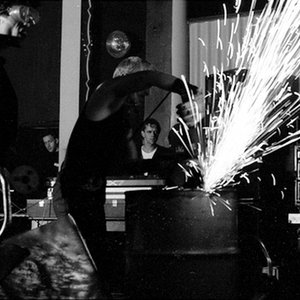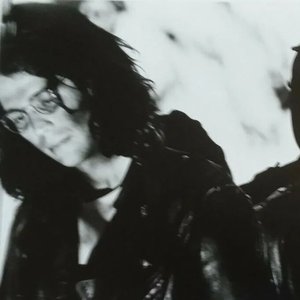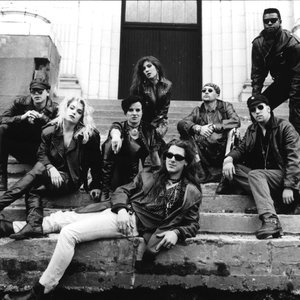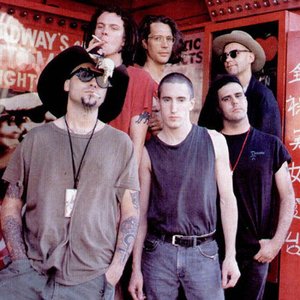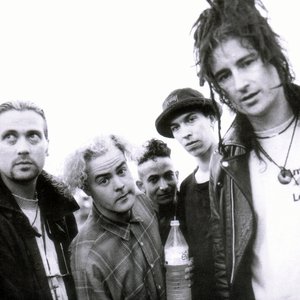Biografie
-
Geburtstag
10. November 1964 (59 Jahre alt)
-
Geboren in
Edinburgh, Scotland, Vereinigtes Königreich
Of the multitudes of recording artists which populate the various strata of the contemporary music world, very few have either the verve or tenacity in sonic metastasis as the likes of Chris Connelly.
His arc of evolving talent is quite well known to the initiated: constantly shifting gears and mutating from the earliest of days in Rigor Mortis (later to become Fini Tribe) to the infamous Revolting Cocks, or side projects like Acid Horse (with members of Caberet Voltaire) and the one-off release The Love Interest. The hey-day of the loosely fitting term “industrial rock” had all but wound up during the late Eighties and early Nineties, through which Connelly maintained a high profile within the ranks of Ministry and then shortly after crossing over to the post-punk experimental circus called Pigface, helmed by Martin Atkins and his label Invisible Records. In retrospect, this change would prove to be a blessing in disguise of sorts, allowing for Connelly to exhibit deeper lyricism as well as a far wider range of vocal skill more true to his own style rather than that of the atypical distortion-blistered screams of metallic mechanical rage. Murder, Inc. followed suit, bringing to light a brilliant blend of Chris’ angst-laden lounge crooning against a backdrop of Killing Joke-esque post-industrial noise rock. To the converted, this record remains a fan favorite not quickly forgotten; when later incarnations of Pigface (without Connelly) would play the album’s title track, crowds would tend to fall into a chaotic reverie of shaking fists and shoulder-to-shoulder mosh pits.
Amongst the revolving melee of his interactions, collaborations and contributions to numerous projects and records, Connelly released his first proper solo outing, Whiplash Boychild, in 1991 after the wake of Ministry’s A Mind Is a Terrible Thing to Taste tour and Pigface’s initial effort Gub. Those anticipating the chain-link fence bashing, dreadlocked, sinister vocalist to do more of the same were in for a rude awakening indeed. Eschewing the violent, metallic and overtly electronic overtones of prior efforts, what Connelly delivered instead was a melodic, poetic, often times beautiful affair, maintaining the truisms of underground music whilst flirting with the conventions of well intended pop. Many comparisons have been drawn countless times through the years toward the likes of David Bowie and Scott Walker (both of whom Connelly himself fondly admits admiration), but also slight reminiscences of early eighties Iggy Pop and sublime touches of lounge music. His 1992 follow up, Phenobarb Bambalam, was a more extreme record; bipolarizing the two fronts of his songwriting between the excesses of angry post-rock and the melancholia of smoke-filled lounge balladeering, both exercised (and exorcised) with ingenious clarity. Aside from a live acoustic EP, Songs for Swinging Junkies, it would be two years before he would release another full length studio recording.
The wait would prove to be worthwhile. His third studio release Shipwreck laid out the perfect amalgam of the two previous records, delivering elements of pop, post-modern rock and endearingly touching lounge ballads that make your head swim. Connelly even went so far as to do “Spoonfed Celeste”, a song that defies categorization aside from being deemed “neo-bluegrass”. Stunningly beautiful with smooth production, the troubadour comes truly into his own here, with no apologies.
A vast, gaping hole of four years’ silence was left yawning in the aftermath.
Eventually, at the turn of the century, Chris returned to the place where his talents lay best: singing, songwriting and all the poetry which lay within. Of first note, Mr. Connelly produced his debut book, a hardcover collection of songwords and poems entitled Confessions of the Highest Bidder in the early summer of 1999. Initially instigated by the overwhelming requests of fans and listeners in 1996, Chris decided to plunge into the task of arranging and dissecting some of his catalogue of work; which was then, by the auspices of KB Publishing, awarded to those demands in its 112-page glory.
And what about the music? No longer on his longtime label Wax Trax, Chicago based Hit It! Records released an album of his new material under the moniker The Bells. The album was titled The Ultimate Seaside Companion, which — along with Chris — featured his long running friend and collaborator Bill Rieflin as well as other indie luminaries such as Chris Bruce and Jim O’Rourke. Far and away, this record was a clear and distinctive departure from Connelly’s past approaches to structure and production. Not merely handling the lyrics and general basis of his material, he wholeheartedly took the helm of his own ship: playing and directing the songs with acoustic and electric guitar, banjo, and even utilizing the harmonica at points. Having stripped away the artifice of so-called “rock production” and unconcerned with carrying the weight of his past reputation (under the pseudonym of a band rather than his own name), Connelly was able to quite simply get down to basics: writing emotive and sincere songs without the prejudice of an already established audience preying on his past. The Ultimate Seaside Companion’s successes lay strictly within that regimen: pure, focused, honest songs done without the need and greed of the almighty dollar, MTV, or the overzealous “industrial” fan who still think of Chris Connelly as the dreadlocked, enraged duke of RevCo, Ministry and Pigface.
What happened next was probably the most surprising and unexpected move that Mr. Connelly could have ever considered at that particular point of his career.
Invisible Records’ Martin Atkins was busy getting up a new project with his former PiL band mate Jah Wobble, who in turn suggested Killing Joke guitarist Geordie Walker to round out the experiment’s music section. As rumor has it, once things got going, they had attempted to get John Lydon to handle the lyric/vocal duties but were dismissed. Atkins (and appropriately so) suggested Connelly. The result was the Damage Manual; with one EP and one full-length album under its belt, it would, in a sense, mark the “return” of Chris Connelly to the “industrial” realm once again.
Later that same year, Mr. Connelly would release yet another album: the swooning, eloquent and near cinematic Blonde Exodus. Again utilizing the assistance of Bill Rieflin and continuing upon the path laid down by The Ultimate Seaside Companion, Blonde Exodus would deliver even more clearly the radiant and minimalist ingenuity of Connelly’s songwriting abilities — both as a sublime lyricist and a heartfelt vocalist. In the midst of this period, Chris and Bill would also record an album called Largo, which was released on Rieflin’s First World label.
The year 2002 would announce the delivery of Private Education, and 8 song set of pared-down acoustic numbers, or “charcoal reliefs” as noted by Chris himself; performed entirely solo with the exception of a guest appearance by former Voodou vocalist Michelle Walters, providing some additional backing vocals. Stark and minimal, the material took on a shape all its own, solid in the traditional songwriting sense that Chris is so prone to compose — yet baring an assemblage of vocal melodies and guitar textuality that made the most of any limitations of the instrumental palette. Recorded over the course of two days and drawn from experiences over the previous year, the artfulness of Connelly’s lyrics took to the fore over the more bare (however far from barren) musical arrangements; aurally blurring the lines — like the difference between the delicacy of an origami construct and the simple beauty of a fine line pencil illustration — poignantly lent to the context of sound. From the tidal ebb and flow of the near 8 minute opener “Harbour Days” and pacing itself eloquently through to the record’s closer “The Last Hit Man In Heaven”, we are seduced, not clubbed, by the raw sublime intention.
That same year, Underground Inc. released a collection personally selected by Connelly, Initials C.C. Vol. 1, culling material spanning over 20 years: a widely diverse and scattered collage of his musical experimentation including tracks from his “home-made” tape experiments with Andy McGregor, out-takes from his involvement with the likes of Fini Tribe, Revolting Cocks, Pigface, F/I, PTP, The Damage Manual and, of course, his solo work. Without question a fine addendum to his steadily growing catalogue.
After a challenging and long-running road show of touring throughout ‘02 and ‘03, a break from the rigors of international touring indeed seems well-deserved.
Künstlerbeschreibungen auf Last.fm können von allen bearbeitet werden. Du kannst dich gerne beteiligen.
Sämtliche von Benutzern eingestellte Texte auf dieser Seite sind unter der Creative-Commons-Attribution/Share-Alike-Lizenz verfügbar. Es können weitere Bedingungen zutreffen.

